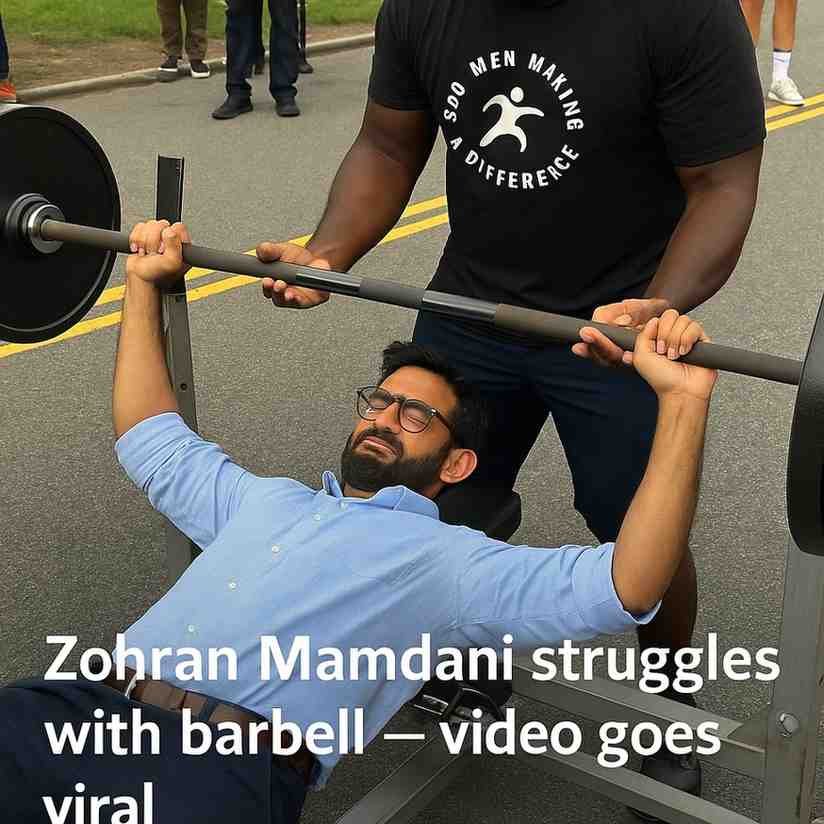Zohran Mamdani’s Viral Bench-Press Flub: Strength, Symbolism, and Political Undercurrents at Men’s Day in Brooklyn
On August 23, 2025, New York City’s annual Men’s Day open‑streets celebration in Brooklyn took an unexpected political turn. In the midst of outdoor gyms, live DJs, car shows, and celebratory energy, mayoral front‑runner Zohran Mamdani, a 33‑year‑old Democratic Socialist candidate, attempted a simple feat of physical strength—and instead became the source of a sensational viral moment.
The Fateful Lift
Clad in campaign‑ready attire, Mamdani stepped up to a standard bench‑press setup featuring a 135‑pound barbell. Pressured by bystanders to “show off,” he hesitated initially, only to comply amid cheers and encouragement. The result? Mamdani struggled to lift the bar unassisted and needed considerable help from a muscular volunteer from the group 500 Men Making a Difference to manage two shaky reps.
A video capturing the moment spread like wildfire on X (formerly Twitter), prompting both mockery and media frenzy. One user humorously quipped: “When he refers to ‘benching two plates’ he means one on each side”—a bite of online sarcasm that highlighted the sharp reactions.
Political Punchlines in Real Time
The incident quickly became political ammunition. Mayor Eric Adams, not missing a beat, posted a contrasting clip from the very same event: he bench‑pressed the identical weight himself, seemingly effortlessly, with minimal help from the same spotter. His caption was blunt:
“64 vs. 33. A lifetime of hard work vs. a silver spoon. The results speak for themselves. The weight of the job is too heavy for ‘Mamscrawny.’ The only thing he can lift is your taxes.”
This jab laid bare a generational and class‑tinged critique, turning physical strength into political symbolism.
Meanwhile, Andrew Cuomo, running as an independent candidate, aimed another remark at Mamdani’s expense:
“It’s easy to talk, it’s hard to carry the burden. This guy can’t bench his own body weight, let alone carry the weight of leading the most important city in the world.”
This barbed comment further amplified the mockery, suggesting that Mamdani’s performance reflected deeper questions about his readiness for leadership.
Viral Reactions: Between Support and Scorn
The response online was sharply divided.
Some social media users rallied behind Mamdani, viewing the moment through a humanizing lens: a politician not afraid to join the crowd, to participate—even if imperfectly. Others seized the moment for satire. One snarky remark observed: “So he folds easily under peer pressure? Not a very good leadership trait. Just saying.” Another dissected his form: “He locked his elbow,” while a few went further: “Benching twice your body weight is quite impressive.
This fracturing of public sentiment underscored how modern politics often merges performance with perceptions of character: every gesture—physical or verbal—becomes fair game for appraisal.
Beyond the Bench: Connecting with Community
Not all was embarrassment. Mamdani also took to the field of community engagement. After the bench‑press mishap, he shifted gears: ditching his designer boots, he displayed his soccer skills—an homage to his Ugandan roots—kicking a ball at an inflatable target. He mingled with the crowd, snapped selfies along Eastern Parkway, and even dropped a short speech expressing gratitude: “It is such a pleasure to be here… I look forward to being your next mayor next year.” These gestures reflected a deliberate attempt to recast the moment—as relatable, vibrant, and authentic.
The Setting: Men’s Day as Political Stage
Men’s Day in Brooklyn is more than a festival—it’s an annual open-streets tradition featuring fitness demonstrations, music performances, art, and auto showcases. On a summer’s day, it draws hundreds—and in 2025, it became a stage for unexpected political theater.
What Mamdani may have envisioned as a light, symbolic participation—“showing muscles” in a communal environment—unfolded into a high‑stakes moment once cameras and social media took over.
Stakes and Strategy: A Campaign Under Spotlight
Mamdani isn’t just any candidate—he’s the first Muslim nominee for the Democratic Party in New York City’s mayoral race, and a formidable frontrunner. A Siena poll placed him 19 points ahead of Cuomo, while a 12‑poll aggregate from Decision Desk HQ showed a 13‑point lead.
But in politics, as this episode proves, momentum can be fragile. A viral moment can spell either reinforcement of a candidate’s relatability or opening for ridicule. The “Mamscrawny” meme, within hours, became shorthand for the campaign’s lighter—or harsher—reinterpretation.
Reflections: Strength, Symbolism, and Social Media
This episode is emblematic of modern politics: symbolism matters—every gesture can be spun as metaphoric proof of leadership, strength, or weakness. Social media accelerates this process: what meant as a casual attempt at approachability became a litmus test for character in the digital court of public opinion.
Moreover, it underscores how political rivals can seize an incident—with video, meme, or soundbite—to shape narratives in real time. Adams painted a story of “hard work vs. privilege”; Cuomo leaned into narratives of burden and responsibility.
Looking Ahead: Can Mamdani Reclaim the Frame?
The real question now: will Mamdani’s campaign let this define him—or will he pivot? His engagement in other event activities shows adaptability. If he leans into authenticity and community connection, he could neutralize the moment. If he recedes or ignores the fallout, it risks defining his public persona.
In the end, an attempted bench-press turned into a political x-ray: exposing not just physical frailty, but the fragile dance of campaign image-making under the glare of social media. On a day meant to celebrate strength and community, Mamdani instead provided a tension-filled spectacle—one watched, re-watched, memed, and judged by a watching city.

